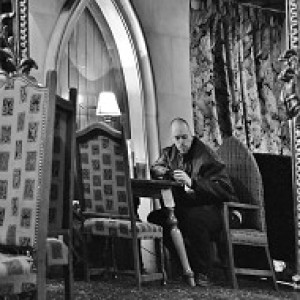Feathers & Chickens
A century ago today, Charles Cooper Uniacke Penrose Fitzgerald became responsible for one of the most shameful and historically reviled street campaigns of modern times. A vice-admiral in the Royal Navy, he'd risen through the ranks without ever seeing battle - though he'd once been shot in a hunting accident which forced him to spend an entire year lying completely horizontal - and wasn't the most popular figure among the Admiralty since his support of a new communications system in the 1890s which resulted in a catastrophic collision, sinking the flagship of the Royal Navy's Mediterranean fleet and drowning its rear-admiral. By August 1914, he was a man with a lot of time on his hands, but his enthusiasm for meddling had never diminished. He wanted to boost recruitment for the armed forces, and to that end, he hatched an idea which was as malicious and degrading as it was cruelly effective; so much so that it remains infamous to this day.
The idea was that British women should confer upon any man they encountered in civilian clothes "the Order of the White Feather" - denoted by affixing a small white feather to his clothes - as a way of confronting him over his supposed cowardice and shaming him into volunteering.
First and foremost, it's important to recognise that some pacifist feminists of the time (including the likes of Sylvia Pankhurst and Virginia Woolf) remained profoundly opposed to the Great War and the popular militarism it provoked - including the Order of the White Feather - at great personal risk to themselves, as they became increasingly ostracised not just from public opinion, but also from their closest allies in years gone by. Because the wider suffragist movement, led by the ever-pragmatic Emmeline and Christabel Pankhurst, were all too eager to get into the government's good graces by wholeheartedly embracing the white feather campaign.
However, the widespread popularity of the White Feather Brigade during its most influential phase in 1914 and 1915 hit heights (or plumbed depths) that the pre-war suffrage movement could only have dreamed of, galvanising women of all ages and classes in every town and city. Where the just and intellectual argument for the right to vote had stumbled, the more straightforward opportunity to scorn and humiliate men flourished. Why? I suspect the reasons were as diverse as the countless women who participated in the movement, but you don't have to look too far beyond the repressive gender relations of pre-war society, the feeling of liberation and empowerment achieved by exercising personal sovereignty even in an exceptionally cruel manner, and the helpful cultural zeitgeist created by the government and press which assured women that urging young men to join up by any means necessary was a fundamentally admirable thing to do. To persuade younger girls to join in with the campaign, women's magazines even printed romance stories about girls giving a white feather to a man in civilian clothes who then turned out - gosh, golly, by Jove! - to be a decorated war hero so impressed by the girl's patriotism that he swept her right off her feet and married her thirty seconds later.
Of course, on the many occasions that the White Feather Brigade did mistakenly accuse soldiers on leave of cowardice, marriage proposals rarely ensued. When it happened to Private Ernest Atkins on a tram one day, he produced his army paybook and smacked the woman responsible around the face with it, telling her "I'm in civvies because people think my uniform might be lousy, but if I had it on I wouldn't be half as lousy as you." Reuben Farrow was also on a tram when he was called a coward, and responded by removing his arms from his pockets and pushing the stump of his right hand in front of his accuser's eyes. A poison pen letter still exists which was sent anonymously to a boy accusing him of being a "chicken"; he was thirteen years old.
By 1917, the White Feather Brigade had become its own worst enemy, with soldiers and civilians alike disgusted by the shameful lengths its adherents had gone to. As pacifist ideals resurfaced following the war, the actions of the white feather women were vilified to the extent that when the BBC tried to contact surviving members in the 1960s for a documentary, from several thousand enquiries, they only managed to find two women willing to admit their involvement, both of them wanting to confess how ashamed they felt at the things they'd once said and done.
A lesson, perhaps, in how insidiously propaganda can massage our notions of right and wrong until we're willing to do the indefensible in the name of some nebulous "greater good".
- 0
- 0
- Nikon D3100
- 1/50
- f/5.6
- 55mm
- 280

Comments
Sign in or get an account to comment.


